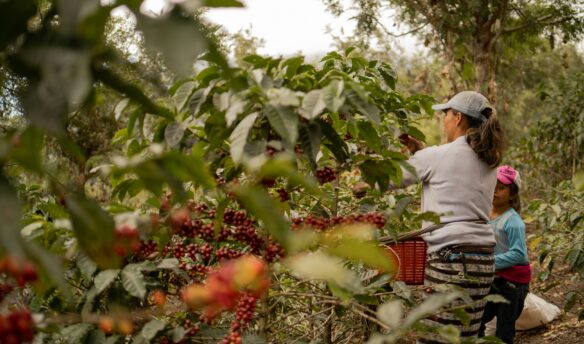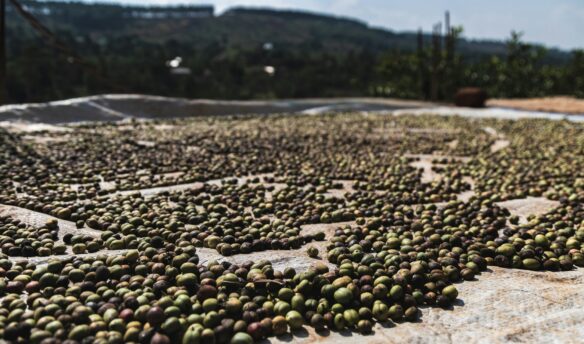Would you like an edible with your coffee? California looks to Amsterdam to help struggling cannabis purveyors. Plus, Colectivo Coffee workers ratify their first union contract, and Starbucks racks up losses before the NLRB.
‘Colectivo Coffee Workers Approve First Union Contract’ – via Daily Coffee News
Nearly three years after launching their unionization campaign, workers at Colectivo Coffee, a regional coffee chain with locations in Wisconsin and Illinois, voted to ratify their first union contract by a 95% margin.
The contract will cover around 600 workers across the two states. The unionized group known as the Colectivo Collective comprises workers in Milwaukee and Madison represented by the International Brotherhood of Electrical Workers Local 494 and workers in Chicago represented by IBEW Local 220.
“This contract ratification is the culmination of the efforts of hundreds of workers over the past three years,” organizer Hillary Laskonis said in an announcement. “We could not have made it to this point without their bravery, the tireless work of the folks at the IBEW, as well as the vocal support of thousands of customers and members of the community.”
Workers began organizing in August 2020—union negotiations proved contentious as the Milwaukee-based specialty chain pushed back against the movement with several captive audience meetings. An initial vote to unionize in 2021 ended in a 99-99 tie, but the National Labor Relations Board stepped in to review contested ballots and ruled in favor of the union, pushing the vote to 106-99. Colectivo Coffee challenged the vote, but the NLRB rejected their request in March 2022.
“Colectivo has always been committed to being an employer of choice,” said Colectivo President Scott Isabella in a statement. “This ratified contract is an expression of that commitment. Colectivo looks forward to working with IBEW Locals 494 and 1220 to continue delivering a great employee and customer experience.”
The three-year contract fight highlights the difficult path that can follow a victorious union vote. For a union to confer protections and rights for its workers, the union must agree on a contract with ownership, which can take years. Some negotiations happen quickly—workers at Intelligentsia Coffee in Chicago secured a contract just four months after voting to unionize—but for others, negotiating a contract can take far longer. For example, none of the over 300+ unionized Starbucks stores has ratified a contract—both Starbucks and the workers blame one another for the delay in negotiation. Starbucks Workers United recently called on the chain to negotiate a nationwide contract and end the delays.
‘Amsterdam-Style Coffeeshops May Be Coming To California’ – via Sprudge
California’s cannabis industry is in a weird place: businesses are struggling to cope with high taxes and a thriving black market, while the state’s small farms battle intensifying storms and drought, affecting supply. The cannabis industry faces an “extinction event” unless things improve—one option being considered is to expand the dispensary concept towards a more Amsterdam-style model.
Koffieshops—cafes serving both coffee and cannabis products—are a famous part of Amsterdam’s culture. Although there’s been a recent backlash to koffieshops in the Netherlands, particularly to tourists who frequent these spaces and disrupt the local market, some in California see them as a potential savior of the state’s cannabis industry.
Currently, Californian cannabis businesses can only operate as dispensaries, selling products to customers who take them home. A new bill—passed through the State Assembly with sweeping bipartisan support—would allow dispensaries to expand their offerings. Assemblymember Matt Haney of San Francisco, who introduced the bill, says dispensaries may be able to add “coffee, food, and live music” as potential revenue streams.
“Lots of people want to enjoy legal cannabis in the company of others,” said Haney. “And many people want to do that while sipping coffee, eating a scone, or listening to music. There’s absolutely no good reason from an economic, health or safety standpoint that the state should make that illegal. If an authorized cannabis retail store wants to also sell a cup of coffee and a sandwich, we should allow cities to make that possible and stop holding back these small businesses.”
Haney pointed to the economic pull of Amsterdam’s koffieshops, which bring in over $1 billion yearly in sales. However, he clarified that this law wouldn’t apply to regular cafes in California. “To be clear, we’re not saying that coffee shops should be allowed to sell cannabis,” Haney said. “We’re saying that cannabis shops should be allowed to sell coffee. It shouldn’t be illegal for an existing cannabis business to move away from only selling marijuana and instead have the opportunity to grow, thrive and create jobs by offering coffee or live jazz.”
‘Nestlé Trials Giving Cash to Coffee Farmers Who Grow Beans Sustainably’ – via Reuters
Nestlé is piloting a program that financially rewards coffee farmers who invest in regenerative agriculture practices as part of the conglomerate’s Nescafé Plan 2030.
The company describes the move as “financial support schemes to help farmers transition to more sustainable practices.” The pilot is ongoing: “Nescafé is seeing encouraging results and strong farmer engagement.”
Around 3,000 producers in Cote d’Ivoire, Indonesia, and Mexico are part of the pilot which is “testing conditional cash incentives to reward the transition to regenerative agriculture and the rejuvenation of coffee plots as well as weather insurance schemes to protect farmers’ income against the unexpected effects of climate change.” Exactly how much each farmer received was not reported.
The program is part of Nestlé’s $1 billion Nescafé Plan 2030, launched in 2022, and aims to “help drive regenerative agriculture, reduce greenhouse gas emissions and improve farmers’ livelihoods.” As we noted at the time of the Nescafé Plan 2030 announcement, committing money to help the people most at risk from climate change is a good thing—even if it took more than 150 years and a lot of pollution for the company to act.
Rainforest Alliance, an organization not immune from criticism, is monitoring the plan. “We have observed encouraging trends, including improved incomes in some countries, and increased adoption of important regenerative practices, such as integrated weed and pest management,” said Monitoring and Evaluation Manager Yustika Muharastri.
More News
‘Entry Period Open for 2024 Good Food Awards for Coffee’ – via Daily Coffee News
‘Moccamaster Is Brewing Up A Father’s Day Giveaway Or Forty’ – via Sprudge
‘China’s Luckin Coffee Reaches 10,000-store Milestone‘ – via World Coffee Portal
‘Farmer Brothers Selling Texas Coffee Facility to TreeHouse for $100 Million‘ – via Daily Coffee News
‘Grounds For Health & Peet’s Team Up For Summer Long #WhereSheIs Campaign’ – via Sprudge
‘Ofi Introduces US$8.2 Million Sustainable Indonesia Coffee Production Project‘ – via Global Coffee Report
‘15th Grounds for Health Auction Coming June 14-15‘ – via Daily Coffee News
‘Costa Rica Coffee Exports Jump in May, Logistics Problems Persist‘ – via Nasdaq
The Week in Coffee Unionizing
Over the past eight months, NLRB administrative law judges have overseen 17 cases concerning the union drive at Starbucks. Starbucks has lost 16 of these cases. Violations include worker intimidation, unlawful discipline, and termination of union organizers, according to a report in Bloomberg Law.
The report found that Starbucks also illegally interfered with NLRB processes in several cases. “It’s not just that Starbucks is breaking the law within the four walls of their own stores, but then they’re also trying to block employees from getting a fair shot at telling the board how their rights have been violated,” said Sharon Block, Executive Director of Harvard’s Center for Labor and a Just Economy and former NLRB member. “I think that speaks to how cavalier this company is about how the law applies to them, or rather, how they believe it doesn’t apply to them.”
Bloomberg Law’s analysis of the 17 cases shows that Starbucks’ response to union activity intensified as organizing progressed, from shortening cafe hours and illegally staffing stores with managers to firing workers and calling the police on worker demonstrations.
“They can’t stop workers from voting for the union. They’ve already tried and failed in that,” said Mark Gaston Pearce, former NLRB chair and head of Georgetown Law’s Workers Rights Institute. “So the next phase is to commit as many unfair labor practices as possible and then intimidate the workforce into not testifying against them.”
Starbucks rejected the notion that the anti-union pushback is a corporate strategy, noting that the company has policies prohibiting retaliation against organizers. “We respect the right of all partners to make their own decisions about union representation without fear of reprisal or retaliation, and we are committed to engaging in good faith collective bargaining for each store where a union has been appropriately certified,” a company spokesperson said.
Starbucks has lodged 100 charges against Starbucks Workers United, mostly involving refusal to bargain on the part of the union. The NLRB has dismissed around 90% of these charges while the rest remain under investigation.
Is Coffee Good For You?
Pesticides used during coffee production leads to health problems in humans and animals—and their use is increasing. A new meta-study from Denmark’s University of Copenhagen, published in Plant Pathology, looks at the current research around pesticide use on coffee farms and outlines possible alternative strategies, from agroforestry to biological controls and even new genomic techniques.
The study looked at research from Brazil, Colombia, Jamaica, and Nicaragua, which showed that pesticides sickened agricultural workers and contaminated water supplies.
“The problem is that there are more and more reports of pesticide contamination in groundwater and ecosystems, and harmful symptoms and disorders among animals and humans in areas where coffee is grown—from skin disorders, respiratory problems, to high blood pressure, organ damage, cancer and cardiovascular disease,” said lead author Athina Koutouleas from the university’s Department of Geosciences and Natural Resource Management. “All of this seems to be linked to the use of pesticides in coffee production.”
Chemical pesticide use in Brazil has increased by 190% over the past ten years. Since 2019, 475 new pesticides have been approved for use in the country. More than a third of these pesticides are banned in the European Union.
“If we want to enjoy our morning coffee in the future, we’ll need to stop producing it like there is no tomorrow,” Koutouleas said. “Pesticides are effective against pests and plant diseases and can provide coffee farmers with a high yield in the short term. But in the long run, you shoot yourself in the foot by destroying ecosystems and health at large.”
The study authors recommend several alternatives to pesticides, such as investing in agroforestry, which can diversify farmer income through timber or cash crops. Agroforestry can be combined with biological controls such as beneficial insects or microorganisms (think the parasitic wasps helping fend off the coffee berry borer in Hawaii).
Researchers also recommended a genomic technique called RNA interference, where RNA molecules are sprayed onto the coffee, switching off specific genes in the organism that threaten the plant. Although one of the advantages of this new technique is its specificity—it only affects the pests that damage coffee plants—and its relatively low cost at scale, it has yet to be tested.
While the vast majority of coffee is grown by small farmers on small plots of land, the authors blame pesticide use and its effects on large, monoculture farms. “It is this small percentage of coffee farmers who are pushing production in an unsustainable direction by growing coffee as monoculture and using lots of pesticides,” Koutouleas said. “But if you degrade the environment in which coffee grows, the very environment which the plant relies on is jeopardized.”
Beyond the Headlines
‘Single-origin Coffee is Creating Unsustainable Models for Small-scale Growers’ by Layla Zaglul Ruiz
‘Ben & Jerry’s Is the Anti-Starbucks’ by Terri Gerstein
‘In Ukraine, Foundation Coffee’s Gas-Powered Espresso Life During Wartime’ by Yaroslav Druziuk















